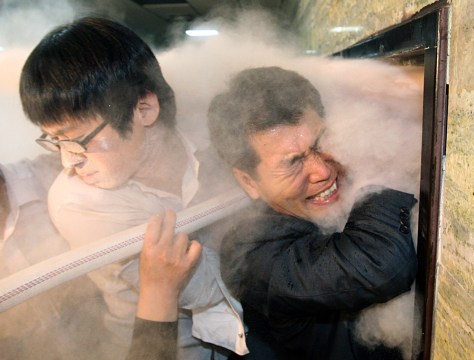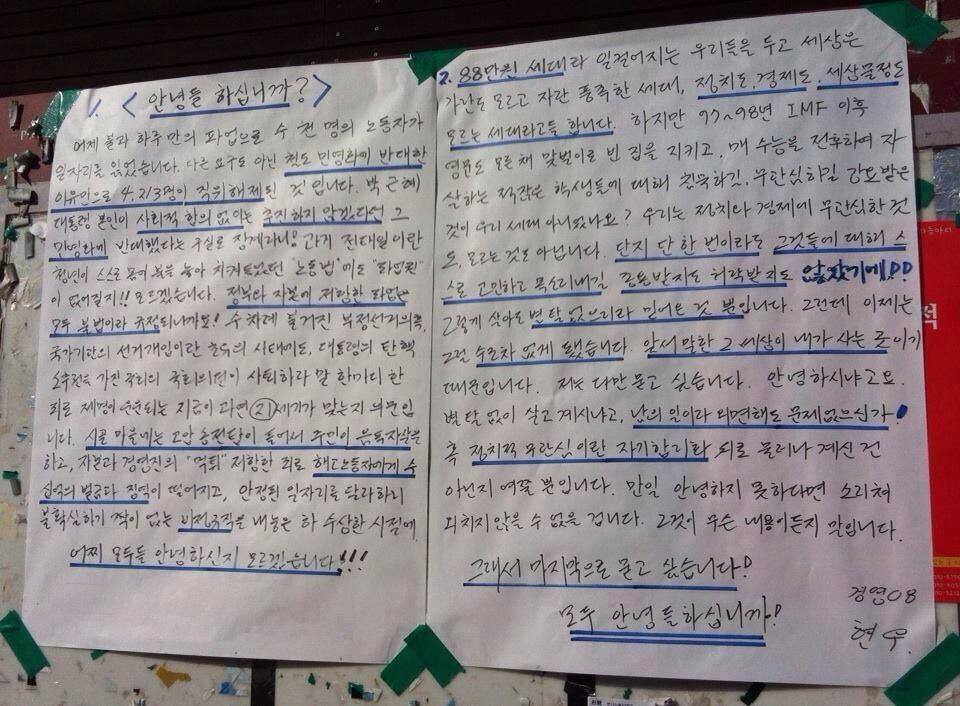I'd like to thank The Marmot, and also The Big Hominid, for writing up my Five Tips post. I got a few defensive reactions to as well: some people seem to have been reading it as "Five Ways Roboseyo Thinks He's Smarter Than Other Bloggers, And You In Particular" or "Five Ways Lifers Are Looking Down Their Noses At Noobs" or "Five Hints To Shut Down Your Blog, Asshole" --As Marmot's Hole commenter Briere says, "But in my opinion what Rob has done is give a big 'shut it' to others who want to express an opinion. It is elitist to try keep others out of the conversation, and that is what a list like Rob's attempts to do." So a few sentences are in order.
First, I do think that the piece was written with the appropriate caveats and explanations that a careful, or even just moderately un-rushed reading would make my intentions clear... but in case anybody skimmed it and decided I was telling people, or them in particular to "Shut it," let's start with the point that every person has the right to write out their opinions and experiences of living in Korea, and anybody who tries to invalidate their experience should go piss up a rope.
But when people are taking their lived experience of Korea, and trying to go a bit deeper, to understand something within a larger context than their own daily lives, or when people are trying to write authoritatively about Korea - for example, foreign correspondents, or when locals read stuff that's written English, and get confused or upset that this is what "foreigners" seem to think about Korea... then I think these principles are useful for sifting through everybody who's positioning themselves as authorities or experts on Korea, to figure out who backs it up, and who, despite ponderous tones, is actually only speaking for themselves (not that there's anything wrong with that).
This is relevant because someone who doesn't know the terrain sometimes accidentally shows their ass, like the time The Diplomat used satire blog Dokdo Is Ours as a source for an article about Korea's information economy (on page 2), and a few guidelines would have helped them. Or when those defensive nationalist netizen brigades take a personal experience of Korea, and decide it makes a person deserving of an online campaign, or the exposure of their personal data, leading to physical threats against their person. Or simply when someone is looking for more knowledge about Korea, but go to the wrong source, and end up in a "blind leading the blind" bind, getting mired in the Dave's/Bitter Expat echo chamber. It's a shame when someone doesn't spot the phoneys, ends up getting misled, and has their learning process slowed by getting sidetracked on such rabbit trails.
I don't think anybody needs to stop writing, but I do think that it greatly increases the credibility of those posing as knowledgeable, when their writing demonstrates a clear understanding of the limits of their expertise. And the writing I respect the most chooses topics where the limitations of their own knowledge are not hindrances to the points they are trying to make or at least where they cop to the gaps, and leave those spots as questions and suggestions rather than definitive statements.
When I wrote this list, then, here were the people I was imagining would find it useful:
Is there a place for people writing about Korea, who don't actually know a whole ton? Absolutely. I will defend their right to write as they please, and wish them luck: go back and read the first three years of my blog posting (they're all still up there, in cringe-inducing glory). It'd sure be hypocritical for me to say other writers don't have the right to throw themselves into the online discourse meat grinder if they wish to... and hopefully it'll inspire their curiosity, and they'll have some interesting, knowledgeable, and patient, so patient, commenters and correspondents to show up and point them toward more knowledge and better sources, the way I was lucky to have.
So... are the five tips hard and fast rules? Nope. And which of the five tips (or others one could add) are more or less relevant will change for different topics - language is more important in talking about local culture and trends than it is in talking about foreign policy or security, for example, and having Korean language ability, or Korean ethnicity, doesn't automatically make someone an expert any more than marrying a Korean or living here for a long time does, though each of those gives someone access to certain kinds of knowledge about Korea, that might be useful for writing about certain topics. At best, let's hope they're a reminder to think critically about whatever one reads, wherever one finds it, and think carefully about the source of an opinion or argument before deciding to let it rustle one's jimmies.
To hammer that home, I'll give The Big Hominid the final word: I think he read my article exactly as it was meant to be read, and the thoughtfulness of his response demonstrates that well, wrapping up with this:
First, I do think that the piece was written with the appropriate caveats and explanations that a careful, or even just moderately un-rushed reading would make my intentions clear... but in case anybody skimmed it and decided I was telling people, or them in particular to "Shut it," let's start with the point that every person has the right to write out their opinions and experiences of living in Korea, and anybody who tries to invalidate their experience should go piss up a rope.
But when people are taking their lived experience of Korea, and trying to go a bit deeper, to understand something within a larger context than their own daily lives, or when people are trying to write authoritatively about Korea - for example, foreign correspondents, or when locals read stuff that's written English, and get confused or upset that this is what "foreigners" seem to think about Korea... then I think these principles are useful for sifting through everybody who's positioning themselves as authorities or experts on Korea, to figure out who backs it up, and who, despite ponderous tones, is actually only speaking for themselves (not that there's anything wrong with that).
This is relevant because someone who doesn't know the terrain sometimes accidentally shows their ass, like the time The Diplomat used satire blog Dokdo Is Ours as a source for an article about Korea's information economy (on page 2), and a few guidelines would have helped them. Or when those defensive nationalist netizen brigades take a personal experience of Korea, and decide it makes a person deserving of an online campaign, or the exposure of their personal data, leading to physical threats against their person. Or simply when someone is looking for more knowledge about Korea, but go to the wrong source, and end up in a "blind leading the blind" bind, getting mired in the Dave's/Bitter Expat echo chamber. It's a shame when someone doesn't spot the phoneys, ends up getting misled, and has their learning process slowed by getting sidetracked on such rabbit trails.
I don't think anybody needs to stop writing, but I do think that it greatly increases the credibility of those posing as knowledgeable, when their writing demonstrates a clear understanding of the limits of their expertise. And the writing I respect the most chooses topics where the limitations of their own knowledge are not hindrances to the points they are trying to make or at least where they cop to the gaps, and leave those spots as questions and suggestions rather than definitive statements.
When I wrote this list, then, here were the people I was imagining would find it useful:
- foreign correspondents still getting to know the area
- Koreans or other "Korea defenders" thinking about starting a netizen backlash to "correct" someone's "wrong opinion"of Korea
- people unsure where to turn to increase their knowledge about Korea
- readers (usually Korean) upset that these are the opinions foreigners are forming about Korea
- people wishing to avoid common pitfalls, while trying to start writing more seriously about Korea
Is there a place for people writing about Korea, who don't actually know a whole ton? Absolutely. I will defend their right to write as they please, and wish them luck: go back and read the first three years of my blog posting (they're all still up there, in cringe-inducing glory). It'd sure be hypocritical for me to say other writers don't have the right to throw themselves into the online discourse meat grinder if they wish to... and hopefully it'll inspire their curiosity, and they'll have some interesting, knowledgeable, and patient, so patient, commenters and correspondents to show up and point them toward more knowledge and better sources, the way I was lucky to have.
So... are the five tips hard and fast rules? Nope. And which of the five tips (or others one could add) are more or less relevant will change for different topics - language is more important in talking about local culture and trends than it is in talking about foreign policy or security, for example, and having Korean language ability, or Korean ethnicity, doesn't automatically make someone an expert any more than marrying a Korean or living here for a long time does, though each of those gives someone access to certain kinds of knowledge about Korea, that might be useful for writing about certain topics. At best, let's hope they're a reminder to think critically about whatever one reads, wherever one finds it, and think carefully about the source of an opinion or argument before deciding to let it rustle one's jimmies.
To hammer that home, I'll give The Big Hominid the final word: I think he read my article exactly as it was meant to be read, and the thoughtfulness of his response demonstrates that well, wrapping up with this:
Don't take Roboseyo's post too literally; instead, when you're reading something about Korea, adopt what we in religious studies call a hermeneutic of suspicion—what normal folks call taking that with a grain of salt. That hermeneutic of suspicion is, I think, what Rob is driving at.









